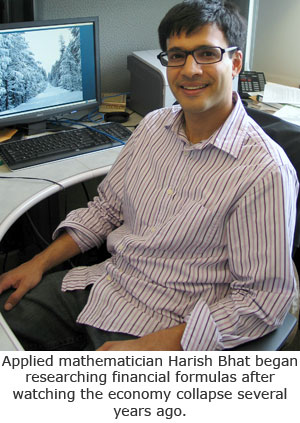

UC Merced
applied mathProfessor
Harish Bhatwatched the financial markets collapse while he was teaching at Columbia University several years ago.
The costly miscalculations by so many major Wall Street firms and the unanswered questions about what went so wrong compelled Bhat to look into the relationship between mathematics and finance’s failed models.
“All the formulas people were using weren’t as good as they said they were. They weren’t on a sound footing,” he noted. “It’s a good time to repair the damage.”
Bhat, who also researches circuits, began studying up on probability and finance. He also began trading stocks online to get a feel for how the market functions. He has since had a paper he wrote with his graduate student Nitesh Kumar accepted for publication in the proceedings from the 2009 Society for Industrial and Applied Mathematics Conference on Mathematics for Industry.
The paper, “Markov Tree Options Pricing,” questions one of the fundamental assumptions made in the pricing of European stock options - that daily returns of a stock are independent and identically distributed. The assumption is part of the Black-Scholes model, which has been around for decades. Bhat argues that using a Markov chain provides a better way to estimate returns by accounting for the option’s changes. It’s an example of the university’s innovative research into some of society’s most-pressing problems.
The proposal represents such a paradigm shift that some have been resistant to it, Bhat said. “People are kind of skeptical,” Bhat said. “A visitor from the Haas School of Business at UC Berkeley was open to the idea, but wanted to see more empirical studies that confirm our findings before tossing out the standard dogma.”
The Black-Scholes model provides a neat formula that’s fairly easy to use. Bhat’s approach is based on an algorithm that takes into consideration a stock’s past performance as it gauges potential values.
More people will be convinced this is a better system, Bhat said, as he publishes more papers about it.
He continues to research other causes of the financial collapse that math could help fix. He wants to come up with a formula that could better predict mortgage loan defaults — investment risks — by accounting for geographical differences. For example, people in the Central Valley may be more likely to default than someone living in New York.
Bhat came to UC Merced from Claremont McKenna College. He was drawn to this campus because of the emphasis on applying mathematical solutions to the world’s issues and because of the intimate atmosphere that allows for close interaction between professors and students.
“It’s a UC campus,” he noted, “but its size makes it feel like a small private college.”






